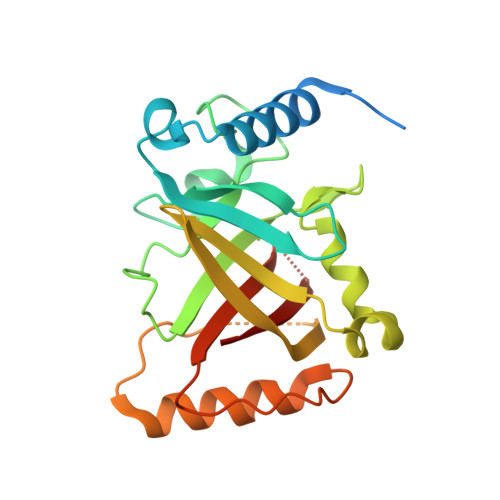Functional analysis ofClostridium difficilesortase B reveals key residues for catalytic activity and substrate specificity.
Kang, C.Y., Huang, I.H., Chou, C.C., Wu, T.Y., Chang, J.C., Hsiao, Y.Y., Cheng, C.H., Tsai, W.J., Hsu, K.C., Wang, S.(2020) J Biological Chem 295: 3734-3745
- PubMed: 32005667
- DOI: https://doi.org/10.1074/jbc.RA119.011322
- Primary Citation of Related Structures:
6KYC, 6KYD - PubMed Abstract:
Most of Gram-positive bacteria anchor surface proteins to the peptidoglycan cell wall by sortase, a cysteine transpeptidase that targets proteins displaying a cell wall sorting signal. Unlike other bacteria, Clostridium difficile , the major human pathogen responsible for antibiotic-associated diarrhea, has only a single functional sortase (SrtB). Sortase's vital importance in bacterial virulence has been long recognized, and C. difficile sortase B (Cd-SrtB) has become an attractive therapeutic target for managing C. difficile infection. A better understanding of the molecular activity of Cd-SrtB may help spur the development of effective agents against C. difficile infection. In this study, using site-directed mutagenesis, biochemical and biophysical tools, LC-MS/MS, and crystallographic analyses, we identified key residues essential for Cd-SrtB catalysis and substrate recognition. To the best of our knowledge, we report the first evidence that a conserved serine residue near the active site participates in the catalytic activity of Cd-SrtB and also SrtB from Staphylococcus aureus The serine residue indispensable for SrtB activity may be involved in stabilizing a thioacyl-enzyme intermediate because it is neither a nucleophilic residue nor a substrate-interacting residue, based on the LC-MS/MS data and available structural models of SrtB-substrate complexes. Furthermore, we also demonstrated that residues 163-168 located on the β6/β7 loop of Cd-SrtB dominate specific recognition of the peptide substrate PPKTG. The results of this work reveal key residues with roles in catalysis and substrate specificity of Cd-SrtB.
- Department of Microbiology and Immunology, College of Medicine, National Cheng Kung University, Tainan 701, Taiwan; Center of Infectious Disease and Signaling Research, National Cheng Kung University, Tainan 701, Taiwan.
Organizational Affiliation:
















